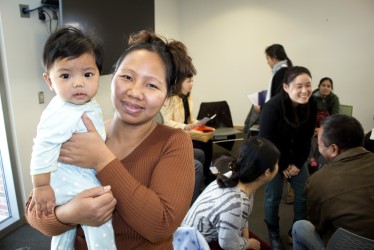
Chapel Hill is preparing an action plan to help immigrants and refugees feel valued and to fully participate alongside their neighbors in the social, civic, and economic fabric of their adopted hometown.
The action plan is the second phase of a two-year collaborative planning process with UNC-Chapel Hill in developing strategies for being more inclusive and responsive to the needs and interests of immigrant and refugee community members.
In 2018, Chapel Hill completed the Community Assessment and Action Planning Phases of this project, which included extensive resident engagement. We held meetings in eight languages that were attended by more than 150 immigrant and refugee community members from 15 different countries.
A culminating report, detailing the findings from these community sessions, was released in fall 2018 from the Chapel Hill Building Integrated Communities project (Chapel Hill BIC), a two-year collaboration among the Town of Chapel Hill, local community groups and residents, and a statewide program based at UNC-Chapel Hill. Chapel Hill BIC aims to understand the experiences of immigrant and refugee residents and develop recommendations for the Town Council to consider that support the integration, wellbeing, and leadership development of immigrant and refugee community members.
Chapel Hill BIC released the executive summary in English, Spanish, Burmese, Karen, and Mandarin Chinese languages that includes community perspectives and recommendations for local government. Find the executive summary and full report at https://www.townofchapelhill.org/bic.

The report finds that of the roughly 59,000 people living in Chapel Hill about 9,691, or 16.5 percent, of town residents were born outside of the United States. The top five countries of origin are China, India, Korea, Mexico, and the U.K. In addition, Orange County welcomed 1,121 refugees since 2005; most refugees come from Burma/Myanmar, Cameroon, the Democratic Republic of Congo, El Salvador, Haiti, Iran, Iraq, Laos, Russia and Syria.
The preliminary findings and recommendations reflect the valuable input of over 250 local residents who took part in public meetings, surveys, interviews, and oral histories.
Findings include –
* Chapel Hill Transit is the only form of transportation to which many have access.
* Current bus routes do not offer late night routes to many locations where immigrants and refugees live.
* Many face challenges in affordable housing.
* Some were enthusiastic about local law enforcement efforts to develop identification documents for use by immigrant community members.
* Some have fears of gun violence and youth drug abuse.
* Strong interest in civic engagement and leadership opportunities.
* Highly value local leaders’ efforts to engage their perspectives and recommendation.
* Key languages critical for communication are Spanish, Chinese, Karen and Burmese.
Resident recommendations include –
* Increase access to public transit.
* Continue to explore affordable housing strategies and improved conditions of existing rental housing.
* Provide interpretation at public meetings and organize more multilingual opportunities for civic education.
* Make communications language more accessible.
* Hire more bilingual staff in local government.
* Expand community-police relationships.

According to the study, Chapel Hill residents born outside of the U.S. and without U.S. citizenship have substantially lower household incomes than residents with U.S. citizenship. However, residents born abroad who are naturalized U.S. citizens have a higher median household income than residents born in the United States.
The report for Building Integrated Communities was authored by Hannah Gill, Isaura Godinez, Jorge Gutierrez and Jessica White. We look forward to the town-wide action plan forthcoming to address recommendations from our residents. For more information about Building Integrated Communities, visit www.townofchapelhill.org/bic.
Check out this video about Chapel Hill’s views on diversity.